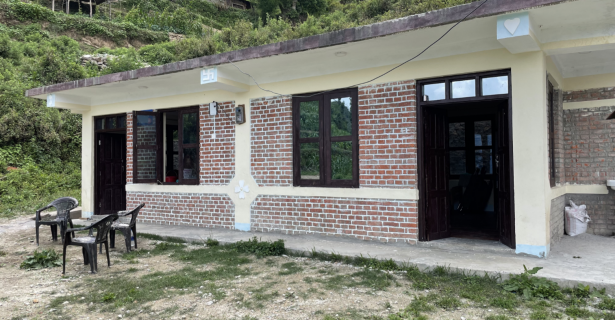In May, six Tufts for Health Equity club members, including myself, had the opportunity to travel to Nepal in order to strengthen our relationship with our partner organization, PHASE Nepal.
PHASE Nepal works to improve the livelihoods of rural people by addressing immediate healthcare needs, providing education services, and creating opportunities for self-empowerment and risk resilience in communities.
Our trip included visiting a remote village in the Gorkha region of Nepal, where a PHASE clinic provides routine healthcare for several nearby villages. The PHASE clinic is vital to the wellbeing of this village as the closest clinics and hospitals would take hours to reach.
Our goal for our time in Manbu was to observe the daily experience of PHASE Nepal’s nurses and community members, as well as learn about the healthcare conditions the community faces. One key demographic within the community the nurses were concerned about was the elderly population. During our time in Manbu, we saw two key health risks facing this population: high blood pressure and the lack of institutional, ongoing individual care. To address the prevalence and risk of high blood pressure within this community, PHASE staff clinicians partner with government health staff to organize programs addressing high blood pressure among the elderly population in the village. We were lucky enough to be able to observe two of these programs in different villages.
On the day of the first program, about 25 residents filed into a classroom at a local school and greeted their friends and the nurses. It was clear that Rashina, the head PHASE clinician in Manbu, knew the community very well. The
program began with education. Rashina informed the attendees about the causes, symptoms, and prevention measures of high blood pressure. Then, one by one, the villagers came to the front for a quick health examination. The nurses recorded their blood pressure, body temperature, and heart rate, as well as providing any medication needed depending on their health status. After the program, we debriefed with Rashina and asked about her assessment of the health conditions of those who attended. She discussed an interesting dynamic regarding the health of elderly villagers. On one hand, the lifestyle in this community is extremely healthy and life expectancy is fairly high (2 of the program attendees were older than 100 years). The diet in the region consists of fresh, unprocessed food from each family’s own farm and residents must be active as the primary form of transportation is walking. On the other hand, the lack of access to healthcare other than PHASE’s clinic takes a toll on the health of residents. Before PHASE implemented a clinic in Manbu, the residents had to either ignore health concerns or travel for hours to the closest clinic or hospital. Now the PHASE clinic is able to address minor health concerns with medication or advice, but medical emergencies are difficult to treat. In order to combat health risks that arise when residents do not receive routine care, community programs such as the one we attended take a preventative approach by providing education and health checkups for a larger group.
In addition to the scarcity of clinics and hospitals in rural regions of Nepal, there are also few long-term care facilities for elderly populations. On the day of the second program to help with high blood pressure conditions, one of the residents informed the PHASE clinician of a blind elderly woman who they thought may need healthcare assistance. Due to cultural norms of caring for one’s parents into old age, most of the elderly population in rural areas live with their children’s families. However, this woman, who is a widow, lives alone, and rarely receives visits from her children and their families. Community members bring her food and she is able to cook it for herself. Despite her competency to care for herself, she still lacks an emotional support system and does not have the means to independently visit a clinic and receive healthcare.
Upon taking the woman’s blood pressure, Rashina, the PHASE clinician, found that it was unhealthily high. The next day, we trekked with Rashina back to this village for a follow-up appointment with the woman. Rashina brought the appropriate medication to address the patient’s high blood pressure and told the patient she would return in five days to check in on her health. Rashina was worried for this woman’s health, but unfortunately could not feasibly travel to her home everyday to provide healthcare and emotional support. Knowing she had to help this vulnerable woman, Rashina decided she would talk with the village leader about sending the woman to a nearby assisted living facility to ensure the woman would receive continuous, individual healthcare and emotional support from the community within such a facility.
These two experiences revealed a few of the health-related challenges facing older populations in rural Nepal. We saw how clini cians worked together to develop educational programs specific to the needs of this vulnerable demographic of the population. One continuous realization throughout our time in Manbu was that the PHASE nurses have a very close, trusting relationship with the community and are whole-heartedly committed to improving each residents’ livelihood.

